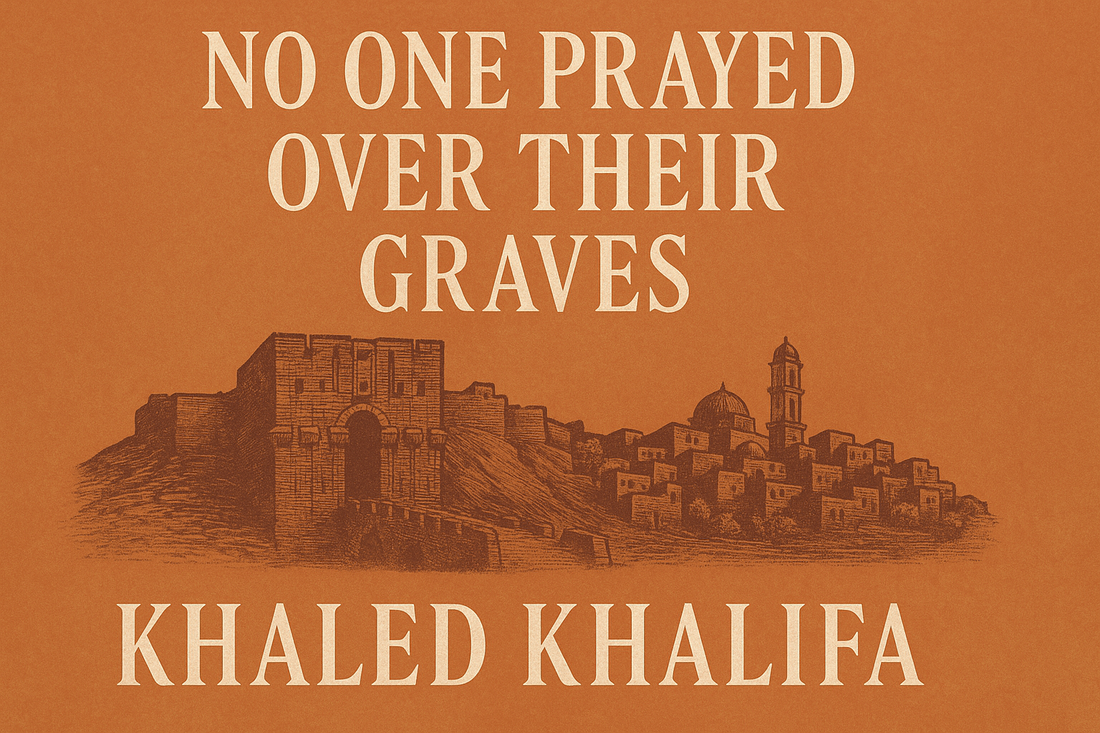
Share
No One Prayed Over Them by Khaled Khalifa — A Heart-Wrenching Epic of Aleppo’s Forgotten Histories
A powerful Syrian novel that blends love, loss, and memory across six decades in Aleppo, Khaled Khalifa’s masterpiece explores the personal and political tragedies that have shaped a city and its people.

It begins in ruin. In a city of ash and memory, where the ghosts outnumber the living and the scent of jasmine dares not bloom too loudly, Khaled Khalifa sharpens his pen — or more accurately, his axe—and gives us No One Prayed Over Their Graves, a novel that reads like a requiem whispered from the belly of Aleppo itself.
It’s not Khalifa’s first foray into the dark thickets of pain and beauty — I’d read No Knives in This City’s Kitchens and knew better than to expect comfort. But nothing prepares you for the slow, lyrical devastation of this book. The first chapter misleads you — a sluggish wade through syrupy detail and what feels like excessive adornment. You’re tempted to sigh, maybe even step away. But do not. Because like any true epic, the story begins to rise from its own weight. What follows is a masterful symphony of intertwined lives, history, identity, and the relentless ache of love and loss.
Set across six sprawling decades, the novel charts the fates of Hanna, a Christian boy who survives the massacre of Mardin and is raised by a Muslim family in Aleppo, and his lifelong bond with Zakaria and Souad. From this triangle blooms a multitude of characters, each more beautifully broken than the last. Khalifa doesn’t just tell a story — he constructs a world, then peels back its skin with poetic elegance.
His Aleppo isn’t the city of postcards; it’s a living, bleeding creature. Through floods, famines, plagues, and massacres, the city becomes both setting and character — shelter and wound. The Citadel, the churches buried beneath rubble, the ghosts of displaced Armenians, Jews, Syriacs — they’re not background; they’re memory itself, pulsing through every page.
There are moments when the prose drips with sensory overload, but when you think you might drown, Khalifa hands you a line so luminous it crackles — “Why wasn’t I a pomegranate blossom on your branch? You are the tree I love.” Or this gut-punch of a farewell: “On my path to vanishing, I leave you my fading footsteps, my breath, and the regret that will never help.” And somewhere in there, you understand why Kafka once said that a book must be the axe for the frozen sea within us. Khalifa has taken that quite literally.
Make no mistake — he is not gentle. Characters you’ve grown to love are yanked from the story with a brutal finality. These aren’t narrative devices; they are emotional ambushes. It’s as if Khalifa is standing in the rubble, whispering, “No one prayed over them — but read, and you’ll remember.” And you will.
The novel’s structural playfulness — its non-linear time shifts, the shifts in narrative voice — might confuse the faint-hearted. But stick with it, and you’re rewarded with a reading experience that’s deeply immersive, textured, and alive. Khalifa switches between omniscient narrator and interior monologue with the ease of a man who knows both the architecture of cities and the soft machinery of the soul.
If I have a quarrel — and as a critic, I’m obligated to — it’s with the entrance of Marianna and Zakaria’s sudden unravelling. Her authority over Hanna felt unearned, and his descent, too abrupt. However, even these flaws seem minor when considered against the scale of what Khalifa has built.
More than anything, this is a story about what remains. After the flood, the plague, the massacre, the silence — what endures? A friendship, a city, a memory. The ache of a love that never had time to flower. The sense that even if no one prayed over them, someone remembered. And that someone is you.
As a final note, we had the privilege of discussing this novel with Khalifa himself in a reader’s group. The man is as generous in person as he is ruthless on the page. He received our critiques with humility, shared the historical weight he carried while writing, and reminded us, gently, that fiction — when done well — is a history lesson with a heartbeat.
So read this novel. It will wound you. It will disorient you. And it will lodge itself in your chest like a shard of memory you didn’t know you needed, evoking a range of emotions that will leave you feeling deeply connected to the story.
Because sometimes, the most honest prayer is a story that refuses to forget.
